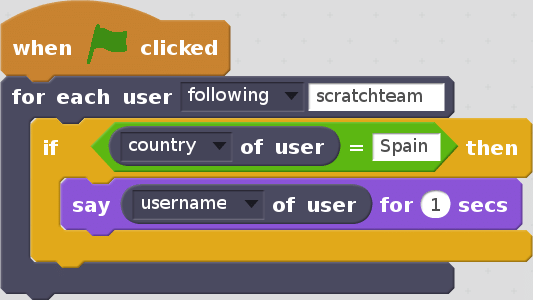Scratchegram-Based Social Inquiry
Содержание |
Scratchegram-Based Social Inquiry (Proposal)
How we can support children as Data Scientists?
In previous paper | Wikigrams-Based Social Inquiry we presented simple methods of learning analytics based on the data on collaboration as well as on the methods of creating static graphs (Graphviz) and dynamic models (NetLogo)
- Network science is an emerging, highly interdisciplinary research area that aims to develop theoretical and practical approaches and techniques to increase our understanding of natural and man-made networks. A working definition of network science is the study of network representations of physical, biological, and social phenomena leading to predictive models of these phenomena
- Network literacy - As our world becomes increasingly connected through the use of networks that allow instantaneous communication and the spread of information, the degree of people’s understanding of how these networks work will play a major role in determining how much society will benefit from this heightened connectivity. In short, a networked society requires network literacy: basic knowledge about how networks can be used as a tool for discovery and decision-making, and about both their potential benefits and pitfalls, made accessible for all people living in today’s networked world.
Mapping to Design
Mapping communities to Engeström’s principles of design
- Clearly define the social object your service is built around.
- Define the verbs that users perform on the objects, so that it's clear what the site is for.
- Make the objects shareable.
| Community | Clearly define the social object | Define the verbs that users perform on the objects | Make the objects shareable |
|---|---|---|---|
| Globaloria http://globaloria.com/ | Computer Game | Play -> Plan -> Prototype -> Program -> Publish -> Play | Shareability |
| Scratch https://scratch.mit.edu/ | Scratch project | Imagine -> Create -> Play -> Share -> Reflect -> Imagine | Shareability - Remix, BackPack |
| NetLogo Modeling Commons http://modelingcommons.org/ | Netlogo model | Create -> Run -> Share -> Comment -> Modify -> Create variations of | Collaboratore |
| StarLogo TNG http://www.slnova.org/ | StarLogo TNG model | Create -> Run -> Edit Incorporate -> Share | ? |
| CloudWorks http://cloudworks.ac.uk/ | Cloud | Find, Share, Discuss | Shareability |
| WebGrid http://webgrid.typed.com/ | Grid | Display -> Cluster -> Map -> Crossplot -> Matches -> Compare | Shareability |
| Letopisi http://letopisi.org/ | Page, Graph | Read -> Create -> Edit -> Connect -> Share -> Read | Each wiki pages is open for editing |
Activities & Logs
Termites cycle
search-for-chip find-new-pile put-down-chip

Termites cycle with Logs

Scratch spiral
imagine what they want to do, create a project based on their ideas, play with their creations, share their ideas and creations with others, reflect on their experiences

Letopisi.org circle

Letopisi.org circle with log

Wikigrams as static graphs (
Dynamic graphs
Scratch Community Blocks
- Scratch Community Blocks: Supporting Children As Data Scientists.
Just as the design of Logo by Papert and others was fundamentally shaped to support details of the constructionist theory of learning—rather than merely part of an attempt to turn children into programmers—the shift in the locus of data analysis from adults to children is only one visible feature of our approach as designers. Beyond this obvious shift lie two broad goals that parallel key features of successful constructionist learning toolkits in general. Those features are the ability to support learning through making in a social context and the ability to support self-reflection and learning about learning.
Proposal

References
- Hill, B. M., & Monroy-Hernández, A. (2017). A longitudinal dataset of five years of public activity in the Scratch online community. Scientific Data, 4, 170002. https://doi.org/10.1038/sdata.2017.2
- Dasgupta, S., & Hill, B. M. (2017). Scratch Community Blocks: Supporting Children As Data Scientists. In Proceedings of the 2017 CHI Conference on Human Factors in Computing Systems (pp. 3620–3631). New York, NY, USA: ACM. https://doi.org/10.1145/3025453.3025847

